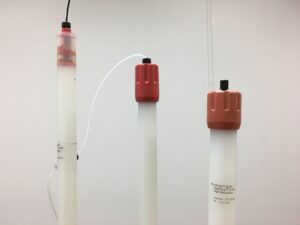Agricultural Resources Engineering and Economics
Students will learn about agriculture in general to acquire the specialized knowledge and techniques related to biological functions, production environment, production distribution system, and distribution economic mechanism.
We will provide multi-layered education under the sharing and cooperation of each research field, such as nature and social science related to soil, water, weather, science and engineering related to production and distribution system, and socioeconomics related to the international food system.
Agronomy
This area is primarily concerned with scientific analysis of the life phenomena of bioresource organisms from the viewpoint of heredity, environment, and interrelations among organisms, so as to contribute to the resolution of global environmental issues. In our laboratories, students conduct research on edible crops such as rice and beans; garden crops such as vegetables and flowers; and bioproduction-related microorganisms, including phytopathogens, and various insects. Each laboratory seeks to improve productivity and product quality, the biological control of pests, the development of biological pesticides and methods of using natural enemies, and the discovery and utilization of new functions hidden in living creatures. Responding to the remarkable progress of the life sciences, we are engaged in education and research that makes good use of gene expression control and tissue culture methods. framework.
Agro-production Environmental Engineering
Establishing the foundations for bioproduction is the basic target of this special area. We conduct research and education aimed at improving bioresource output and creating affluent rural areas through the utilization, control and preservation of the natural environment, and creation of new technologies. This area covers an extensive array of subjects, including those that involve soil, water, living creatures, weather, and our society. Our research goal is to explore the best ways to optimize these vast systems. To this end, we have established a uniquely broad academic system that covers both basic and applied fields. This comprehensive approach to academics and engineering allows us to play an important role in fulfilling the increasingly diversified needs of society.
Bioproduction System Engineering
In this area, research is conducted in pursuit of improving productivity and product quality, centering on the mechanization and systematization of each product cycle process, from bioresource production to distribution. This means that we work toward the development of machines related to crop cultivation as the primary step of bioproduction, technologies that boost productivity, improvements in processing, storage, and distribution technologies, as well as improved safety and systemization for the handling of the crops produced. Beyond this, we are making solid inroads in the pursuit of human safety and comfort, as well as in robotization and automation. On the utilization and management sides, improvements in efficiency using the system engineering approach are being achieved.
Agricultural Economics
Bioresource and Bioenvironmental economics covers the socioeconomic issues involved in the international food system, mainly in Asia, to contribute to the stable supply of safe food and to the environmentally sustainable development of domestic and foreign food industries and regional economies. Attaining these objectives requires not only basic knowledge of bioresource and bioenvironmental economics, but also knowledge of natural science and technological knowledge of food, the environment, and rural economies as well as an international sensibility. Therefore, students are required to complete basic subjects in natural sciences and technological sciences and to nurture an international awareness through close exchanges with students and researchers from Asia, Europe, and America. In this way, they can obtain sufficient knowledge in both natural sciences and technological sciences in addition to social sciences.




